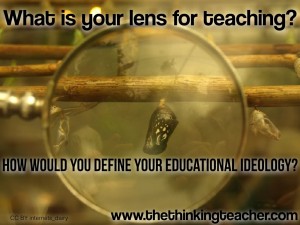 If we want thinking children, we need thinking teachers. This is the premise of my book ‘The Thinking Teacher’, in this series of posts I am sharing some of the key ideas from the book and the thinking behind them.
If we want thinking children, we need thinking teachers. This is the premise of my book ‘The Thinking Teacher’, in this series of posts I am sharing some of the key ideas from the book and the thinking behind them.
This chapter examines educational ideologies, explores a few in detail, and encourages readers to put some time into consciously developing their own.
One only have a quick skim through the education blogosphere to see the amount of debate, discussion and frankly disagreement that builds when people start examining education. Thinking back a few years I am not sure this was such the case. Those who cam first to blogging and tweeting about education were quite often from the background of innovating in learning technology, which often but not always comes from a similar perspective in terms of what is valued in education. As the media and the communities that form around them have become more mature, it seems that an even wider range of perspectives has entered the discourse, and there are many people now blogging about education who are much less inspired by the technology itself and more so by the power it gives them express and examine their views.
There has been much written and tweeted in the last few months about the ‘progressive’ and ‘traditionalist’ positions. Some bloggers such as Andrew Old and Daisy Christodoulou have explored the depths of what these might mean in practice based around the idea that they are two very different and perhaps contradictory positions. Others, such as Tom Sherrington, have rejected the idea that they might be irreconcilable positions, and explore how aspects of both could create a range of learning experience for young people.
It can’t be escaped that this subject has caused fairly heated debate, and animosity between some who would put themselves in different camps. Many have expressed that the discussion is at best unhelpful.
I would argue that examining the lenses through which you see teaching is of utmost importance, and discussions such as this are one way of exploring the different lenses out there that people use that we might better understand and even develop our own.
Given the significant experience of formal education every new teacher brings to what they do, I do think there is a danger that an educational ideology is just assumed and led unexamined and un defined. Challenging this, in my view, should be one of the cornerstones of initial teacher education, yet I do get the impression for other educators I talk to that this may not always be the case.
On the BEd I used to teach on at Plymouth my colleagues had put together an entire module on doing just this, and it was the opportunity to teach on this module that inspired this chapter in ‘The Thinking Teacher’ and indeed much of the book.
In it I explore the importance of figuring out what your ideology is, examining it from other angles and seeking out challenges in order that you might question and develop it. To provide some food for this thought I examine Dewey’s notion of progressives and traditionalist educators that has spurred much of the current discourse, but also other models such as Paul Ernest’s five characters of teachers and Faye’s political horseshoe model.
Although the current discussions about educational ideology might be causing some tensions, it is often the tension of challenge that allows one to form clarity. I don’t think there is a ‘right answer’ here (although that may be indicative of my own ideology). Pragmatically, education is complicated and based on values, which are going to be different for different people.
Whilst educations may have very different ideologies, what is most important is that those ideologies develop from experience, challenge and informed and deliberate thought, and not simply from assumptions that have never been challenged or examined. What matters, I think, is that we are having these conversations and that they continue throughout the teaching profession.
More in ‘The Thinking Teacher’, which is available now in from Bookshop.org (independent book sellers,) Amazon UK, Amazon US and on the iBooks store.
Leave a Reply